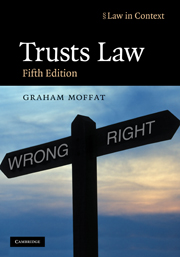Book contents
- Frontmatter
- Contents
- Preface to the fifth edition
- Acknowledgments
- Table of abbreviations
- Useful websites
- Table of statutes
- Table of statutory instruments
- Table of cases
- 1 Trusts introduced
- 2 The evolution of the private express trust
- 3 Taxation, wealth-holding and the private trust
- 4 Creating the trust – I
- 5 Creating the trust – II
- 6 Trusts and public policy
- 7 Flexibility in relation to beneficial entitlement
- 8 The taxation of private trusts
- 9 An introduction to trustees and trusteeship
- 10 Aspects of the management of trusts
- 11 Trusteeship, control and breach of trust
- 12 Implied trusts and the family home
- 13 Trusts in commerce I: occupational pension schemes
- 14 Trusts in commerce II: commerce and equitable remedies
- 15 Trusts in commerce III: commerce, credit and the trust
- 16 Trusts in commerce IV: fiduciary relationships, commerce and the trust
- 17 Trust, contract and unincorporated associations
- 18 An introduction to the law of charity
- 19 A legal definition of ‘charity’
- 20 The regulation of charities
- Index
10 - Aspects of the management of trusts
- Frontmatter
- Contents
- Preface to the fifth edition
- Acknowledgments
- Table of abbreviations
- Useful websites
- Table of statutes
- Table of statutory instruments
- Table of cases
- 1 Trusts introduced
- 2 The evolution of the private express trust
- 3 Taxation, wealth-holding and the private trust
- 4 Creating the trust – I
- 5 Creating the trust – II
- 6 Trusts and public policy
- 7 Flexibility in relation to beneficial entitlement
- 8 The taxation of private trusts
- 9 An introduction to trustees and trusteeship
- 10 Aspects of the management of trusts
- 11 Trusteeship, control and breach of trust
- 12 Implied trusts and the family home
- 13 Trusts in commerce I: occupational pension schemes
- 14 Trusts in commerce II: commerce and equitable remedies
- 15 Trusts in commerce III: commerce, credit and the trust
- 16 Trusts in commerce IV: fiduciary relationships, commerce and the trust
- 17 Trust, contract and unincorporated associations
- 18 An introduction to the law of charity
- 19 A legal definition of ‘charity’
- 20 The regulation of charities
- Index
Summary
Introduction
Management is a convenient umbrella term under which cluster a diversity of trustee tasks. In the case of those trusts not confined simply to the holding and retaining of legal title to designated property, the task dominating all others is that of protecting and indeed enhancing the value of the trust fund through effective investment. But trustees cannot just behave as individuals might with their own funds to invest. The courts of equity, in refining the obligations of trusteeship, have imposed a range of duties upon trustees, some of which impinge directly on the management of the trust fund. In this chapter we therefore consider, in addition to the duty of investment, the duties to act impartially between beneficiaries and not to delegate the trust. There is a complex interaction between these three topics. For example, on the one hand the variety of investments available to trustees suggests a need for expert help, and the process of investment-reinvestment itself necessarily involves some delegation of functions to intermediaries such as real estate valuers, stockbrokers, bankers and solicitors. On the other hand, in principle trustees have until recently been required to reserve to themselves the exercise of their discretions over investment decisions, especially with regard to the duty of impartiality. This long-held principle of non-delegation of discretions seemed increasingly to be at odds with a changing economic and social environment.
- Type
- Chapter
- Information
- Trusts LawText and Materials, pp. 460 - 531Publisher: Cambridge University PressPrint publication year: 2009



